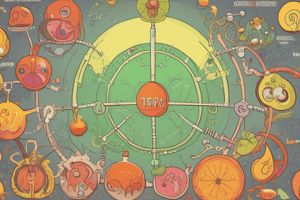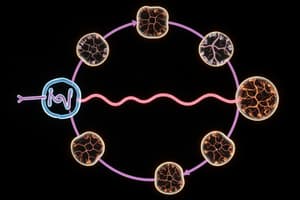Podcast
Questions and Answers
What is the primary function of the Krebs cycle?
What is the primary function of the Krebs cycle?
- To synthesize glucose from non-carbohydrate sources
- To produce NADH and FADH2 for the electron transport chain (correct)
- To break down proteins for energy
- To generate ATP through oxidative phosphorylation
Which molecule is NOT a product of the Krebs cycle?
Which molecule is NOT a product of the Krebs cycle?
- Acetyl-CoA (correct)
- FADH2
- Carbon dioxide
- NADH
During the Krebs cycle, how many molecules of ATP are typically generated from one acetyl-CoA molecule?
During the Krebs cycle, how many molecules of ATP are typically generated from one acetyl-CoA molecule?
- 1 (correct)
- 2
- 3
- 4
Which of the following enzymes is responsible for catalyzing the conversion of citrate to isocitrate in the Krebs cycle?
Which of the following enzymes is responsible for catalyzing the conversion of citrate to isocitrate in the Krebs cycle?
Which of the following is a key regulatory point in the Krebs cycle?
Which of the following is a key regulatory point in the Krebs cycle?
Flashcards are hidden until you start studying
Study Notes
Krebs Cycle Overview
- The primary function of the Krebs cycle is to generate energy through the oxidation of acetyl-CoA, contributing to the production of ATP, NADH, and FADH2.
- It plays a critical role in cellular respiration by providing reducing potential and precursors for biosynthesis.
Products and Non-Products
- Major products of the Krebs cycle include ATP, NADH, FADH2, carbon dioxide, and some intermediates for amino acid synthesis.
- A molecule that is NOT produced in the Krebs cycle is glucose.
ATP Generation
- Typically, one molecule of acetyl-CoA generates three NADH, one FADH2, and one ATP or GTP during the Krebs cycle.
Enzymatic Conversion
- The enzyme that catalyzes the conversion of citrate to isocitrate in the Krebs cycle is aconitase.
Regulatory Points
- A key regulatory point in the Krebs cycle occurs at the conversion of isocitrate to alpha-ketoglutarate, which is controlled by substrate availability and energy levels.
Studying That Suits You
Use AI to generate personalized quizzes and flashcards to suit your learning preferences.




